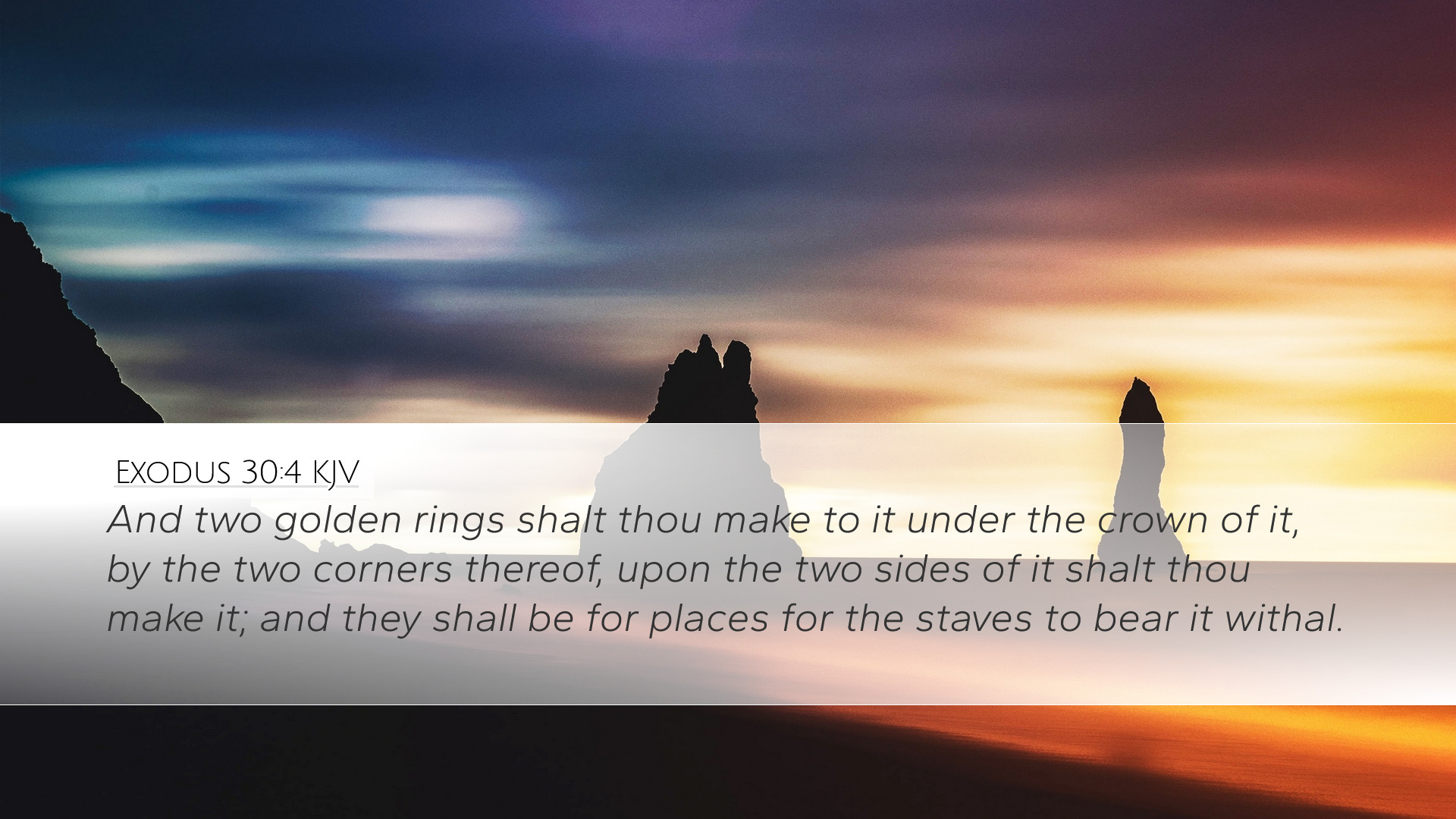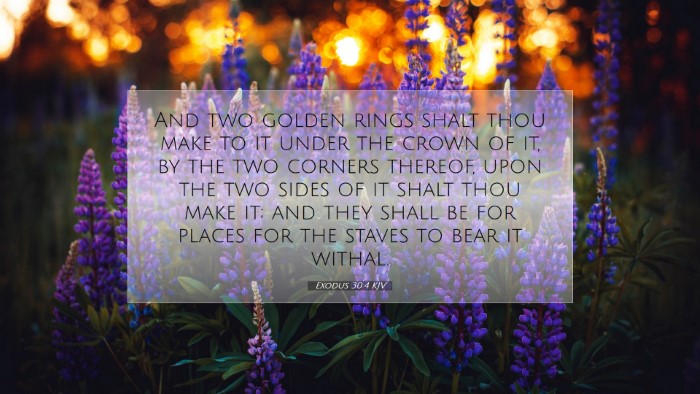Exodus 30:4 Commentary
Bible Verse: Exodus 30:4 - "And two golden rings shall you make for it under the crown of it, by the two corners thereof, upon the two sides of it shall you make it; and they shall be for places for the staves to bear it withal."
Introduction
The instructions given in Exodus 30:4 form part of the broader narrative regarding the construction of the tabernacle and its furnishings. This verse, detailing specific design elements of the altar of incense, underscores the importance of both the physical and ceremonial aspects of worship in the Old Testament.
Contextual Analysis
This verse occurs in the section outlining the materials and methods for constructing sacred objects within the tabernacle (Exodus 30:1-10). The altar of incense was to be a centerpiece of worship, symbolizing the prayers of Israel ascending to God. Thus, every detail carried significant theological implications.
Commentary Insights
-
Matthew Henry's Insights:
Matthew Henry emphasizes the symbolic nature of the altar of incense, noting that the golden rings and staves allow for the altar to be moved easily, representing the portability of worship. He connects this design to the notion of God being present with His people, regardless of their location. The rings serve a practical purpose but also metaphorically indicate the connection between heaven and earth, with incense symbolizing prayer and devotion rising to God.
-
Albert Barnes' Interpretation:
Albert Barnes provides a detailed analysis of the altar's construction and the practicalities involved. He stresses that the altar needed to be both portable and stable. The use of rings is not merely decorative but serves a functional role that ensures the altar could be transported with reverence, highlighting the mobile nature of the Israelites' worship during their Exodus. Barnes reflects on how this underscores God's consideration for the worship practices of His people, ensuring they could remain connected to Him as they journeyed.
-
Adam Clarke's Commentary:
Adam Clarke notes that the specific instructions reflect God’s desire for order and sanctity in worship. Clarke points out that the rings and staves signify readiness to serve, as the priests could carry this vital piece of the tabernacle, ensuring that worship was always at the forefront of their journey. The detailed instructions illustrate God's precise holiness and the importance of adhering to His commandments in worship practices.
Theological Reflections
This passage invites readers to reflect on several key theological themes:
-
Divine Presence:
The altar's construction, coupled with its portability, symbolizes God's desire to dwell among His people. The use of gold signifies purity and divinity, reminding worshippers of the holiness of God as they approach Him in prayer.
-
Worship and Prayer:
The emphasis on the altar of incense as a place for prayer indicates the critical role of communication with God in the life of the believer. The physical act of burning incense mirrors the spiritual act of prayer, highlighting the importance of both in cultivating a relationship with God.
-
Obedience and Reverence:
The meticulous detail in God's instructions underlines the seriousness with which He regards worship. Adhering to these guidelines not only honors God's command but also reflects a heart that seeks to honor Him in all things.
Application for Today
For contemporary pastors, theologians, and scholars, Exodus 30:4 serves as a powerful reminder of the careful approach required in worship. Just as the Israelites adhered to God's instructions in constructing the altar, so too should modern believers approach worship with reverence and intentionality.
-
Worship Practices:
The passage invites reflection on how current worship practices align with biblical principles. Are we creating spaces for prayer that honor God’s holiness? How does our reverence for the sacred inform our worship style?
-
Preparation for Worship:
This portion of Scripture encourages believers to prepare their hearts for worship. Just as the altar was vital for sacrifices and offerings, so should our hearts be ready to engage with God genuinely.
-
Community Worship:
The communal aspect of the Israelites' worship, with emphasis on mobility and shared responsibility, can lead to discussions on the importance of community in worship today. How can churches foster a sense of communal worship that honors God’s presence among them?
Conclusion
Exodus 30:4 provides rich insights into the nature of worship, divine presence, and obedience to God's commandments. The commentaries from respected scholars like Matthew Henry, Albert Barnes, and Adam Clarke encourage deep engagement with the text, offering diverse perspectives that enhance our understanding. As modern believers reflect on this verse, may it inspire a profound commitment to worship that mirrors the intentionality and reverence depicted in the construction of the altar of incense.


